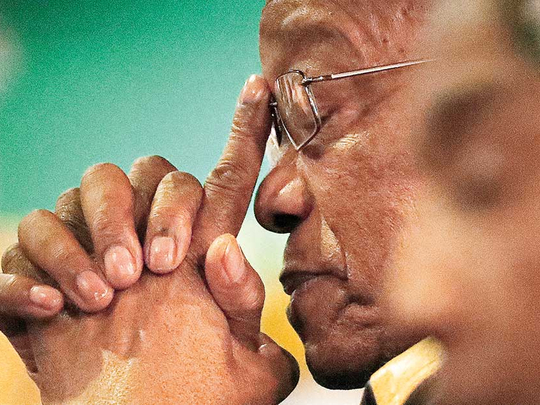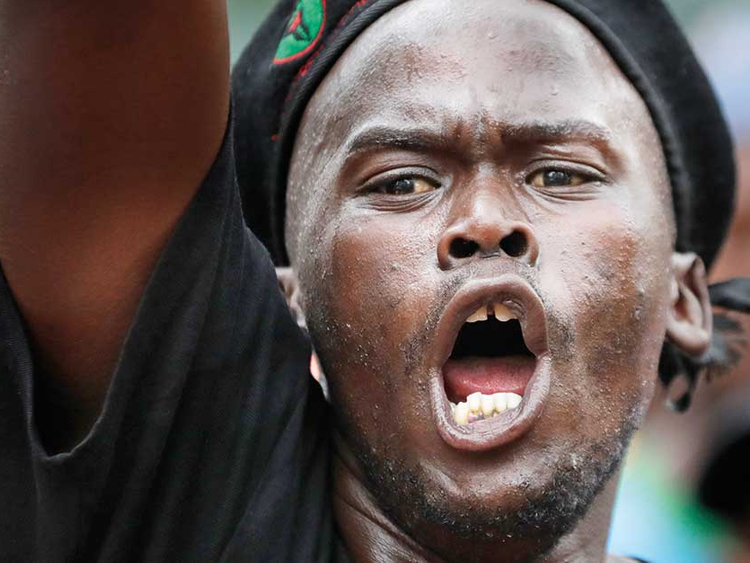
Johannesburg: Jacob Zuma, once a Teflon leader who was acquitted of rape, escaped corruption charges and survived multiple no-confidence votes in Parliament, has become an embarrassment to his party.
The South African president is under intense pressure to resign before his term ends next year. So far, he has refused to go. But as his enemies manoeuvre against him, Zuma could be ousted as early as Wednesday.
On Sunday, Zuma resisted calls from the top six officials in the governing African National Congress to resign. On Monday, the party’s National Working Committee met to decide what to do, calling an emergency meeting of the national executive committee, the only party body that can sack Zuma. The meeting will be held Wednesday.
Deputy President Cyril Ramaphosa won the leadership of the party at a conference in December, meaning he will become the next South African president if the ANC wins elections next year.
Publicly, Ramaphosa insists that he does not want to humiliate Zuma by forcing him out. Privately, however, Zuma’s enemies in the party want him out before Thursday, when he is due to deliver the state of the nation address to Parliament.
Many in the ANC fear that unless Zuma is removed swiftly, the party’s support in elections next year could wither. But the party is deeply divided and a move to topple Zuma may deepen the rifts.
Zuma, 75, is not the first president to face removal during his term of office. Former South African President Thabo Mbeki was toppled by the ANC in 2008, nine months before his term was due to end, in a move orchestrated by Zuma’s supporters.
The corruption charges against Zuma, 783 of them, relate to alleged bribes, including many from a French arms company, Thales. The charges were dropped by prosecutors weeks before the 2009 election, paving the way for Zuma to assume the presidency that year, but they have since been revived by a court. Several other top ANC figures have been implicated in corruption related to Thales.
Critics also claim Zuma allowed his friends from a powerful business family, the Guptas, to have so much influence that they “captured” the South African state.
A forthcoming commission of inquiry into the influence of the Gupta family will probably turn up embarrassing revelations for Zuma and his son Duduzane, who was in a business partnership with the family.
Under Zuma’s leadership, global ratings agencies last year downgraded South Africa’s debt rating to junk status. State-owned utilities, such as Eskom, the electricity provider, and the national airline, South African Airways, have required successive hefty government rescue packages to stay afloat.
Ramaphosa is a former union official who turned to business after losing out in a bid to succeed Nelson Mandela in 1999. He had interests in mining, energy, banking, telecoms and farming but surrendered much of his empire when he became deputy president.
An ANC announcement of Wednesday’s executive committee meeting made it clear Zuma’s future was on the line.
“Amongst the issues to be tabled to the special ... meeting will be preparations for the state of the nation address and a report back from the National Working Committee on matters mandated to it, including management of the transition between the fifth and sixth administration of government and pending actions in Parliament,” the party statement read.
Zuma has insisted it is his role to address the nation. Should he be forced from office, Ramaphosa would probably deliver the speech.
Ramaphosa represented South Africa at the World Economic Forum in Davos, Switzerland, last month, promising to crack down on corruption, and rejecting plans for a nuclear power deal — promoted by Zuma — saying the country could not afford it.
Since his election as party president, South Africa’s currency, the rand, has rallied, amid growing expectations that Zuma will be dumped.
In the lead-up to the December vote on the party presidency, Ramaphosa took the unusual step of stating in a radio interview that he believed Zuma had raped the woman. Zuma’s office rejected his remarks.
“The rape allegations against President Zuma were properly considered by a judge of the High Court. Having evaluated the totality of the evidence, the court acquitted the president of the rape charges. The presidency affirms the rule of law, the independence of the judiciary and the primacy of the courts as the final arbiters in disputes in society.”













